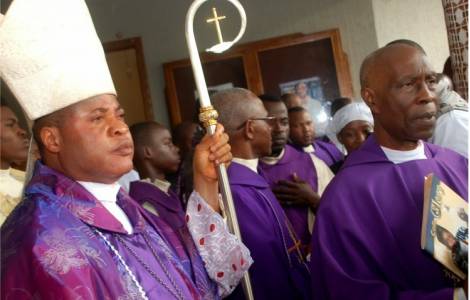
Abuja (Agenzia Fides) - "Since the announcement of the appointment, there have been violent reactions and resistance from a group of the Ahiara diocesan clergy, the laity and others", stresses His Exc. Mgr. Peter Ebere Okpaleke, Bishop of Ahiara, in the Pastoral Letter published on February 14, Ash Wednesday, in which he announced his resignation as Bishop of the Nigerian diocese.
Mgr. Okpaleke had been appointed Bishop of Ahiara diocese on December 7, 2012 by Pope Benedict XVI. His appointment, however, provoked strong opposition both among diocesan priests and some lay people. As recalled in his letter, in the face of this situation, on 15 February 2013 Mgr. Okpaleke "humbly" requested that the period for his Episcopal Consecration and taking canonical possession of Ahiara diocese be extended for more weeks to see if the situation on ground would improve. "The request was granted", the Bishop writes. "The situation did not improve, but eventually was consecrated on May 21, 2013, outside the diocese, at Seat of Wisdom Major Seminary, Ulakwo, Owerri, due to the situation on ground in Ahiara diocese". "Up to now I could not take possession of the diocese of Ahiara", underlines Mgr. Okpaleke, who points out "It is now five years, two months and a week since the Papal appointment. Also the interventions of the Congregation for the Evangelization of Peoples and the Secretariat of State did not yield the desired fruits. The details of peace efforts and the unreasonable, violent reactions of some priests and faithful of Ahiara are still available on the internet".
Mgr. Okpaleke was forced to reside in Awka "where I have remained till date". Not even the intervention of Pope Francis, who invited Mgr. Okpaleke to the Vatican in June 2017, unblocked the situation, despite the fact that the Holy Father had confirmed the appointment of Mgr. Okpaleke and asked for a letter of apology from all the priests incardinated in Ahiara, even those who resided outside the diocese. "I am not in position to say the number that complied faithfully with the Pope's demand", writes Mgr. Okpaleke. "What is clear is that some of the priests asked the lay faithful to take over the leadership of the dispute". Archbishop Okpaleke emphasizes that "till date, the legitimate representatives of the Catholic Church in Ahiara diocese have no access to the cathedral, the curia, etc.".
The attitude of the priests and faithful who rejected the appointment of Mgr. Okpaleke is, in his opinion, "a refusal to give the Holy Spirit a chance", especially since the Bishop had chosen as his episcopal motto "Veni Sancte Spiritus!".
"Taking the above into consideration, I am convinced, in conscience that my remaining the Bishop of Ahiara Diocese is no longer beneficial to the Church", said Mgr. Okpaleke. "I do not think that my apostolate in a diocese where some of the priests and lay faithful are ill disposed to have me in their midst would be effective". "Therefore, for the good of the Church and the Catholic diocese of Ahiara in particular, I humbly requested the Holy Father to accept my resignation from the office of the Bishop of Ahiara. I have taken this step also for the good of all the faithful of Ahiara Diocese, especially those that have remained faithful in a local Church being controlled by some priests", he stresses.
"I consider my resignation from the position of Bishop of Ahiara as the only proper option now to facilitate re-evangelization of the faithful and, most importantly and urgently, the priests of Ahiara Diocese, especially now that the Holy Father and his collaborators in the Roman Curia can already decipher priests who affirmed their loyalty to the Holy Father and those who decided to bow out of the Catholic Church in disobedience".
After thanking those who offered him support in all these difficult years, Mgr. Okpaleke reiterates his love and his prayer towards the faithful of Ahiara Diocese and invites all to repentance. "I invite any dissidenting priests to re-examine their initial motivations for becoming priests in the Catholic Church. Repentance and reconciliation are urgent". (L.M.) (Agenzia Fides, 19/2/2018)
